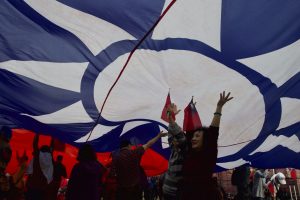The Kuomintang (KMT), or Chinese Nationalist Party, despite being the main opposition party in Taiwan and receiving around 38 percent of the popular vote in the 2020 presidential election, is widely regarded as “pro-China.” In an era in which authoritarian regimes are getting more aggressive, the China-friendly label has caused damage to the KMT’s reputation both at home and abroad.
KMT leaders are well aware of this issue. Yet, no matter who is the party’s chairperson or presidential candidate, they have failed to get rid of this pro-China stigma. This dynamic has confused observers of East Asian politics, and it requires explanation for a better understanding of cross-strait relations.
As with every other political party in the world, a wide spectrum of national identities exist within KMT, and all of them receive different levels of support from party members.
Generally, there are three categories. The first group, led by chairperson Eric Chu, argues that engaging with the United States while maintaining a good relationship with China will make Taiwan safe. The difference between this KMT faction and President Tsai Ing-wen’s cross-strait policy is that Chu and believe sticking to the “1992 Consensus” is the “key” to communicating with Beijing – regardless of the fact that Chinese leader Xi Jinping has declared that the 1992 Consensus means “both sides of the Taiwan Straits belong to one China and will work together toward national reunification.”
This stance on the cross-strait relationship is not acceptable to the bulk of voters from both the KMT and Tsai’s Democratic Progressive Party (DPP). KMT and other pan-Blue voters are of the opinion that Chu’s China policy is too similar to the DPP’s, while pro-Green supporters regard Chu and others as “giving up Taiwan’s sovereignty.” Thus, these leaders have received little support in almost every poll.
The second group in the KMT has a more pro-mainland stance, asserting that the KMT should keep its distance from the United States in order to not frustrate the Chinese Communist Party. They believe that diplomacy, rather than deterrence, is the way to keep the Taiwan Strait safe. To achieve that goal, proponents like former President Ma Ying-jeou insist the Taiwanese government should explicitly state that it agrees with the 1992 Consensus as the foundation for further communications and cooperation.
This community within the KMT has more popularity than all the others, as it claims to offer another way to achieve peace, while proclaiming that it can perform better than the DPP in terms of economic welfare since they are capable of establishing better economic ties with China.
The last group within the KMT mainly consists of veterans and their descendants and is the least popular subgroup within the party. After having retreated from the mainland in 1949, this group of KMT members are die-hard supporters of reunification with China, as they still regard China as their home.
Given the “median voter theorem,” we might expect the KMT’s China policy will ultimately shift toward somewhere between the first and the second group. Yet the situation has not unfolded as the theory supposed, due to the structures and mechanisms within the KMT.
After retreating from China, the KMT veteran community established branches of the Huang Fu-hsing, a highly united group that loyally backed the political leaders who came over with them from China. Huang Fu-hsing members still firmly believe that ultimate reunification is the best option. Although their stance on cross-strait affairs is extreme compared to Taiwan’s general public, Huang Fu-hsing branches represent roughly 25 percent of the party member vote, and reportedly have a meticulous mechanism to allocate all their votes to serve various political aims. As a result, the organization became a comparatively strong power within the KMT.
No one seeking to win the KMT’s chair position could ignore the voice of Huang Fu-hsing simply due to the fact that no single candidate could take the risk of losing 25 percent of the vote in the primary. If that occurred, a candidate would need more to secure more than two-thirds of the vote in the rest of the supporters to barely win the primary. Tus the Huang Fu-hsing must be courted – and the result is that the KMT’s most extreme voices on cross-strait relations have disproportionate clout within the party. Given this dynamic, the KMT’s leader will always to some extent support the most pro-China opinions.
The chair – currently Eric Chu – will be leading the rule-making process to govern the KMT’s primary election for the 2024 presidential election, and thus the presidential candidate’s stance could not shift too much from the chair’s – and the opinions of those deeply pro-China groups.
As a result, all potential KMT candidates for the 2024 presidential election to date have given speeches distancing themselves from the United States. The mayor of New Taipei City, Hou You-yi, claims that “Taiwan should not be a chess piece for the great power”; Eric Chu suggested that Taiwan should accept the 1992 consensus; and Terry Gou asserted that buying weapons from the U.S. could prompt China to attack Taiwan.
These sentiments seem to be very different not only from the DPP position, but from the mainstream of Taiwanese people. Unfortunately, this rhetoric will not change because these KMT candidates all need support from the most extreme side within the party.
As the opposition party, the KMT will still receive support from those who suffer from the economic hardships caused by COVID-19, but the party has provoked serious concerns both domestically and internationally about whether it will provide a China policy that can satisfy the Taiwanese people and the democratic world.

































